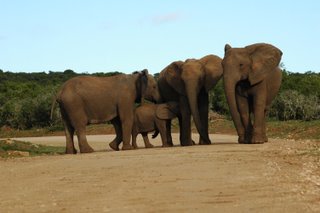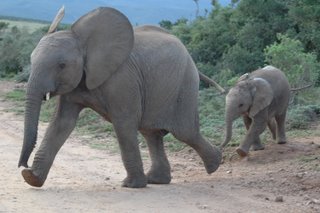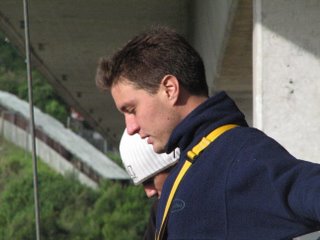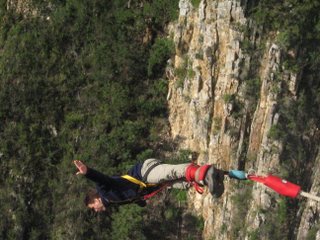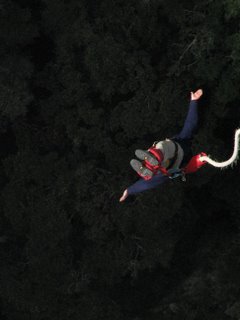"This is the real deal," I heard and I agreed. There I was watching a gay white sangoma dance with a black colleage and an apprentice while a village sung them on. I was in Bulungula. It had taken me some time to get there.
Since the Garden Route and its European vibe, I've tried to come in contact with what I perceive as real Africa. First, I headed for Addo Elephant park. I met Nils, a Dutch guy travelling alone. Together we rented a car and drove to the biggest elephant park in the world. 400 elephants roaming freely on an area bigger than many countries. For two hours we contented ourselves with wild pigs, deer-like animals, and colourful birds. But then we found them: elephants at a distance, we were happy with our fate. We drove on, spotting a few behinds, until we reached the end of a road. Turning back, we got caught in the middle of an elephant herd. Fifty giants crossed the road in front and behind us. A male first, proudly heading for me, veering at the last moment to my relief. And then the females and their cubs. Again and again, and everytime they crossed, they eyed my movements. Picture an animal twice as big as our car judging whether I am a danger to his herd. I was glad to pass the test. Since Nils had a great digital SLR, I am able to add a few pictures on this blog.
I parted ways with Nils at Umtata, capital of the Transkei, home of the Xhosa. Xh is a click sound. From Umtata I headed for Coffee Bay. If the journey to Coffee Bay felt like real Africa, the backpacker I stayed at ruined the impression. Wild parties with enforced drinking rules, I've left these days behind. I was caught in an immature party until I left for Bulungula. I took advantage and learned surfing, standing up many times on the white water, and once on a small wave. I was stoked.
I've mentioned real Africa (and what is real, you will ask) but have not described the Transkei. The Transkei was an independent republic during apartheid in which many Xhosa were forced to live. The republic was only independent in name. Because it was independent the apartheid government was able to ignore its infrastructure and educational needs. As a result of this, 12 years post apartheid, the Transkei is still wild, and the ways of the Xhosa are preserved.The land is a series of rolling hills dotted with colourful rondavels. The dots, homes of the Xhosa, are rarely clustered. Instead, they grace individual hilltops. Their green and pink colours make them stand out across the landscape. The resulting picture is beautiful. Since my pictures are on film, I can only tell you to google Transkei and see the result. But fear not, as soon as I've developed my film, I'll proudly display them to anyone and everyone.
In Coffee Bay, I felt enclosed in an immature party, I've mentioned. The cultural attempts of the coffee Shack, my backpacker, were even more pitiful. We were taken to a headman dinner. There, a menu was rolled out, and a drunken staff member of the Coffee Shack directed the proceedings. First the girls dance, nubile and topless, for the pleasure of the males in the room. Then the boys take over, food is served, q&a time, and more dancing. I am not a fan of shows, and I found this event distasteful. Still I was happy to have come in contact with some of the Xhosa culture. I didn't expect Bulungula.
Through Gill's sister, I'd heard of Bulungula and decided to check it out. After a short shuttle from Coffee Bay, I waited about an hour in a roadside restaurant where no one spoke English, and kids eyed the whitie. Soon a landrover picked me up, Dave, the owner of the place, at the helm. The car was not overkill. The road we went down are so bad that cops don't go into the village. But the roads are worth it: the lodge is magnificent. Still a beautiful lodge is not enough in South Africa. What makes the place special are two things: the community owns 40% of the lodge and uses it as a place to socialise, and the owners take an active part in improving the community whilst preserving their culture. When I was there, three nursery specialists were looking for a site to create a local nursery, hence creating employment and improving nutrition.
One of these specialist was a white Sangoma. A white Zimabwean of wealthy descent, he left everything behind to answer the call of the dreams and become a Sangoma. He claimed to feel the ills in a room. I am not sure I believe him: he told me which girls had their period but I didn't feel comfortable enough to ask them. And when I asked him whether anything was wrong with me, he said no. In fact, I had a sore throat. But perhaps his mind was confused by his gayness. "I am not attracted to gay men," he told me, puffing on his joint. "How do you do it then?" I asked foolishly. "I seduce straight men," he answered looking at me. I was torn between getting away as fast as possible and learning more about Sangomas, and the Xhosa culture he has embraced. Luckily, that was the extent of his flirting and I was able to talk about other things.
The next night, the local sangoma decided to hold a dance in his honour. She decided to use the lodge for the dance, not because she wanted to entertain the few white guests, but because the lodge is the best place to socialise in the village. The ceremony started by thanking the ancestors, and then sacrificing a chicken to their spirit. A trainee sangoma lead the chants, and the crowd responded, clapping to the drum beat. The sangomas danced themselves into trance for the best part of an hour. The scene was magical, incredibly foreign, and not meant to entertain ME, the white visitor. It was for the community and I appreciated it better for it.
Tomorrow I leave for Mauritius and then Madagascar. I am still not sure what to expect.
This is the site of the lodge: http://www.bulungula.com/It doesn't do the place justice.
Tuesday, May 30, 2006
Monday, May 22, 2006
Garden Route
Yesterday I wrote a really witty entry and the computer crashed. So you'll have to do with this one.
I find myself in an internet cafe in Plett, short for Plettenber Bay, about six hours east of Cape Town. I am in the middle of the famous Garden Route, but not for long: this afternoon, I leave for Port Elizabeth. There I will do Addo Elephant Park, where I hope to see the big five.
How did I get here then? Through a friend of a friend of a roommate of Gill, the person I was staying with in Cape Town. Joe, the person I drove with, had just worked a night shift, and needed someone to drive him to Plett, where he was doing a sterilisation drive with the SPCA. While he slept in the back, I spoke to the SPCA anesthesologist, a Xhosa man. He taught me the three clicks in his language. I didn't know the way I called dogs, and the way I reprimanded cats were actual sounds in an African language! Chief, the name of our anesthesologist, is a wealthy man: 17 cows, two houses, and two round huts back home in Umtata in the Transkei.
I was dropped off in Knysna, half an hour before Plett. I'd heard it was nicer than Plett, but I disagree. The man running the backpacker there was more interested in his book than his guests, and the streets were quite unsafe.
I am very interested in the racial interactions in South Africa. Since the distribution of wealth closely follows the colour of one's skin, I permit myself to quiz everyone about their views on racial tensions. And they answer happily. A black man was telling me of the time he presented a debit card to a shop. The girl at the counter looked at him suspiciously and called her manager.
A coloured girl told me she didn't like black guys. Only coloured and whites.
I left Knysna with a French girl and her mother. We tried a hike but it didn't work: the rain stopped us. Soon I was in Plett, where I lived the backpacker life: beers, wine, people ready to party, a cosy fire, a pool table, smoke filled rooms, and bunk beds. Plett has a better feel than Knysna. Less fences, dark streets, and security gates.
Yesterday, I did the world's biggest bungy jump! 216 meters, wow! Looking down I was more than a bit scared, but hey, I had to jump. I have some photos I'll try to post now.
I find myself in an internet cafe in Plett, short for Plettenber Bay, about six hours east of Cape Town. I am in the middle of the famous Garden Route, but not for long: this afternoon, I leave for Port Elizabeth. There I will do Addo Elephant Park, where I hope to see the big five.
How did I get here then? Through a friend of a friend of a roommate of Gill, the person I was staying with in Cape Town. Joe, the person I drove with, had just worked a night shift, and needed someone to drive him to Plett, where he was doing a sterilisation drive with the SPCA. While he slept in the back, I spoke to the SPCA anesthesologist, a Xhosa man. He taught me the three clicks in his language. I didn't know the way I called dogs, and the way I reprimanded cats were actual sounds in an African language! Chief, the name of our anesthesologist, is a wealthy man: 17 cows, two houses, and two round huts back home in Umtata in the Transkei.
I was dropped off in Knysna, half an hour before Plett. I'd heard it was nicer than Plett, but I disagree. The man running the backpacker there was more interested in his book than his guests, and the streets were quite unsafe.
I am very interested in the racial interactions in South Africa. Since the distribution of wealth closely follows the colour of one's skin, I permit myself to quiz everyone about their views on racial tensions. And they answer happily. A black man was telling me of the time he presented a debit card to a shop. The girl at the counter looked at him suspiciously and called her manager.
A coloured girl told me she didn't like black guys. Only coloured and whites.
I left Knysna with a French girl and her mother. We tried a hike but it didn't work: the rain stopped us. Soon I was in Plett, where I lived the backpacker life: beers, wine, people ready to party, a cosy fire, a pool table, smoke filled rooms, and bunk beds. Plett has a better feel than Knysna. Less fences, dark streets, and security gates.
Yesterday, I did the world's biggest bungy jump! 216 meters, wow! Looking down I was more than a bit scared, but hey, I had to jump. I have some photos I'll try to post now.
Tuesday, May 16, 2006
Cape Town proper
I am in the University of Cape Town's commerce labs, and I've only got a couple of minutes to comment on this great city. I've been lucky: I have a friend here who has been more than helpful. When she hasn't pointed me in the right direction, she's taken me there.
And there are so many nice places to go. Cape Town surrounds a mountain on a cape, which is also a peninsula. There are beaches on both sides, and beautiful hikes and views all around. The appartment I'm staying in is right against the mountain, just above the CBD. I wake up to a sweeping view of the mountain, Lion's Head, Signal Hill, the CBD, and in the distance Robben Island. It's hard to ask for more.
Temperatures here aren't bad for the time of the year. With a polar fleece I manage alright. I was warned about security, and although it's not as safe as Australia, it's not as bad as I was told. Gill, the friend I am staying, had her car broken into when we were caving up a mountain, but nothing taken. It was more an act of vandalism than anything else.
There is quite a disparity of wealth. For the rich, life is only marginally cheaper than Australia. But others make do with salaries of R100 a day. That's about AU$20.
Because of this, rich South Africans are spoiled. I was a little stunned when Gill told me not to clean up since the maid was coming the next day. In an appartment of students, a maid? When the maid came, I talked to her: she lives a little way past the airport, in the slums of town. It takes her three hours to get to work. Her Monday was eleven hours long: six in transport, five of actual work.
Now this may sound outrageous to some of you, but it's much better to have servants than not. They're paid a pittance by our standards, but not by theirs. They'd rather work than be punished by our misguided social conscience. And if you want to pay your maid more, why not? But you'd do better if you employed another, say a gardener. Better spread the wealth than localise it.
Cape Town was colonised in the 1600s. It's part of New World, but not in the way of Australia. There are many old and charming buildings, houses with characters, museums of real interest here. Today I was walking in the stunning botanical gardens, which spread from the foot of the mountain. They were gifted to the nation by Rhodes, a name I hear almost as much as Mandela's.
Soon I will leave for the Garden Route, and after that for the Transkei.
And there are so many nice places to go. Cape Town surrounds a mountain on a cape, which is also a peninsula. There are beaches on both sides, and beautiful hikes and views all around. The appartment I'm staying in is right against the mountain, just above the CBD. I wake up to a sweeping view of the mountain, Lion's Head, Signal Hill, the CBD, and in the distance Robben Island. It's hard to ask for more.
Temperatures here aren't bad for the time of the year. With a polar fleece I manage alright. I was warned about security, and although it's not as safe as Australia, it's not as bad as I was told. Gill, the friend I am staying, had her car broken into when we were caving up a mountain, but nothing taken. It was more an act of vandalism than anything else.
There is quite a disparity of wealth. For the rich, life is only marginally cheaper than Australia. But others make do with salaries of R100 a day. That's about AU$20.
Because of this, rich South Africans are spoiled. I was a little stunned when Gill told me not to clean up since the maid was coming the next day. In an appartment of students, a maid? When the maid came, I talked to her: she lives a little way past the airport, in the slums of town. It takes her three hours to get to work. Her Monday was eleven hours long: six in transport, five of actual work.
Now this may sound outrageous to some of you, but it's much better to have servants than not. They're paid a pittance by our standards, but not by theirs. They'd rather work than be punished by our misguided social conscience. And if you want to pay your maid more, why not? But you'd do better if you employed another, say a gardener. Better spread the wealth than localise it.
Cape Town was colonised in the 1600s. It's part of New World, but not in the way of Australia. There are many old and charming buildings, houses with characters, museums of real interest here. Today I was walking in the stunning botanical gardens, which spread from the foot of the mountain. They were gifted to the nation by Rhodes, a name I hear almost as much as Mandela's.
Soon I will leave for the Garden Route, and after that for the Transkei.
Saturday, May 13, 2006
Cape Town
I am in Cape Town at the moment with little time to write but lots to say. The city is beautiful and Gill, my host, has been great.
I arrived from Mauritius a few days ago. Before I go on about South Africa and my limited impressions, I wanted to make a few comments on Mauritius. Let's see if I remember them.
I had dinner with Chrystel and a couple of others on my last night there. I had a little trouble with the Mauritius accent: if I didn't try to listen, I couldn't get half of what they said. This is a country that hasn't been part of France for almost two hundred years, but still decided to hold on to their French. Even though England owned the island before independence, most people speak French before English. And yet the laws are written in English. All but the Napoleonic Code.
Chrystel's mother, affectionately called Pitchounette, told me they call the island the rainbow island, because of all the races. The French Mauritians, the Indians, the Creoles, the Muslims and the other whites, which include the English and the tourists, are the colours of the rainbow, and as Pitchounette put it, they don't mix. An Indian will not marry a French Mauritian. Now apparently, on nearby Reunion, which remained under French control and enjoyed all the aid this entails, the races have mixed.
I went to a village not far from my hotel, and it reminded me a lot of India. Yes, there were Indians, and many of them, but the Indians there aren't typically Indian: they wear shorts, skirts, t-shirts, etc. No, that's not what reminded me of India. Instead it was the architecture, or the lack of. Houses are made of concrete. Concrete decays badly, paint doesn't seem to stick, the slabs stoop, the windows aren't straight, and the buildings feel cheap.
We use concrete everywhere, but not as in these houses: there, concrete makes up the whole house, and it's not poured well.
I said people speak French in Mauritius. It's not the only language they speak. Add Hindi, English and Creole and you get a better idea of the cocktails of cultures there. Creole seems like a simpler version of French with a few English words. Here's an example:
Nou Pays, Nou Labiere
That's the slogan of the national beer. In French, it would be: "Notre Pays, Notre Biere." In English the slogan translates to: "Us Country, Us A-beer" to mean "Our Country, Our Beer."
Creole doesn't seem to have articles. No "the", "a", etc.
I arrived from Mauritius a few days ago. Before I go on about South Africa and my limited impressions, I wanted to make a few comments on Mauritius. Let's see if I remember them.
I had dinner with Chrystel and a couple of others on my last night there. I had a little trouble with the Mauritius accent: if I didn't try to listen, I couldn't get half of what they said. This is a country that hasn't been part of France for almost two hundred years, but still decided to hold on to their French. Even though England owned the island before independence, most people speak French before English. And yet the laws are written in English. All but the Napoleonic Code.
Chrystel's mother, affectionately called Pitchounette, told me they call the island the rainbow island, because of all the races. The French Mauritians, the Indians, the Creoles, the Muslims and the other whites, which include the English and the tourists, are the colours of the rainbow, and as Pitchounette put it, they don't mix. An Indian will not marry a French Mauritian. Now apparently, on nearby Reunion, which remained under French control and enjoyed all the aid this entails, the races have mixed.
I went to a village not far from my hotel, and it reminded me a lot of India. Yes, there were Indians, and many of them, but the Indians there aren't typically Indian: they wear shorts, skirts, t-shirts, etc. No, that's not what reminded me of India. Instead it was the architecture, or the lack of. Houses are made of concrete. Concrete decays badly, paint doesn't seem to stick, the slabs stoop, the windows aren't straight, and the buildings feel cheap.
We use concrete everywhere, but not as in these houses: there, concrete makes up the whole house, and it's not poured well.
I said people speak French in Mauritius. It's not the only language they speak. Add Hindi, English and Creole and you get a better idea of the cocktails of cultures there. Creole seems like a simpler version of French with a few English words. Here's an example:
Nou Pays, Nou Labiere
That's the slogan of the national beer. In French, it would be: "Notre Pays, Notre Biere." In English the slogan translates to: "Us Country, Us A-beer" to mean "Our Country, Our Beer."
Creole doesn't seem to have articles. No "the", "a", etc.
Wednesday, May 10, 2006
Maurice
I am in Mauritius, staying in Pointe D'esny, in a little chambre d'hote. I am getting used to speaking French everywhere. Even though Mauritius sees a lot of English-speaking tourists, locals approach me in French. I've seen them approach others in English. Perhaps, I look French...
The island looks very nice, if it is a little expensive for my student's tastes. Soon, I will head out to the beach and enjoy a swim in a lagoon. I'll follow that with a visit to another village; there, I'll look around the markets, see a bit and then come back. Adrien gave me the number of Chrystel; she has been charming and incredibly helpful. Tomorrow I am flying to Cape Town...
The island looks very nice, if it is a little expensive for my student's tastes. Soon, I will head out to the beach and enjoy a swim in a lagoon. I'll follow that with a visit to another village; there, I'll look around the markets, see a bit and then come back. Adrien gave me the number of Chrystel; she has been charming and incredibly helpful. Tomorrow I am flying to Cape Town...
Sunday, May 07, 2006
Off tomorrow
Right and I'm back to it. Blogging and travelling. Tomorrow I leave for Sydney, and on Tuesday I fly to Mauritius followed by South Africa, and Madagascar. It's all quite exciting. I will try to update this blog at least once a week, more when I can.
The trip breakdown:
SA: 3 weeks
Madagascar: 2 months
Mauritius: few days here and there since it's my transit point.
What I'll be doing:
SA: visiting a friend and getting a feel for the place
Madagascar: discovering the culture, trekking around, and trying to grasp development challenges.
Mauritius: trying not to spend too much money. The island is made for the jetset and honeymooners.
I am going to use this blog rather than emails as my main means of contact. If you have my email address, please send me emails every now and again. It's always nice to hear from people that remind me of home or elsewhere. I'll respond.
If you have any comments, or want to hear more specifics about certain aspects of my trip, you can use the comments part of the site. For the moment, I mainly get ads as comments. For example, you'd like to know how people drive in Madagascar: this is not exactly a private question. Instead of emailing me, use the comments section: click on make a comment. You don't have to sign up.
I decided against taking a digital camera since I won't be carrying a computer around. Because of this, it'll be harder for me to post pictures. I may be able to every now and again, but I guess you'll have to see through my descriptions.
The trip breakdown:
SA: 3 weeks
Madagascar: 2 months
Mauritius: few days here and there since it's my transit point.
What I'll be doing:
SA: visiting a friend and getting a feel for the place
Madagascar: discovering the culture, trekking around, and trying to grasp development challenges.
Mauritius: trying not to spend too much money. The island is made for the jetset and honeymooners.
I am going to use this blog rather than emails as my main means of contact. If you have my email address, please send me emails every now and again. It's always nice to hear from people that remind me of home or elsewhere. I'll respond.
If you have any comments, or want to hear more specifics about certain aspects of my trip, you can use the comments part of the site. For the moment, I mainly get ads as comments. For example, you'd like to know how people drive in Madagascar: this is not exactly a private question. Instead of emailing me, use the comments section: click on make a comment. You don't have to sign up.
I decided against taking a digital camera since I won't be carrying a computer around. Because of this, it'll be harder for me to post pictures. I may be able to every now and again, but I guess you'll have to see through my descriptions.
Subscribe to:
Comments (Atom)
